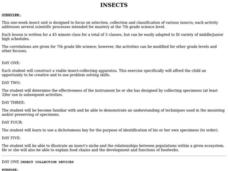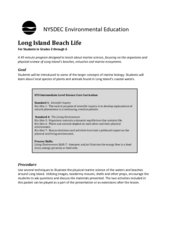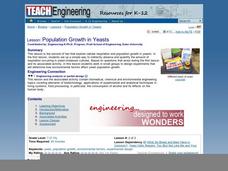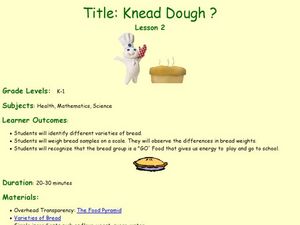Curated OER
Foodborne Illness Educational Materials
Students work in teams to research and create educational material succinctly summarizing known salient fact, including prevention, of a particular foodborne illness. Pupils educational materials are presented in both oral and written...
Curated OER
Osmosis
Fifth graders explore osmosis as they watch organisms divide. In this organism lesson plan, 5th graders use potatoes to experiment with the effects of salty water in the body. Students discuss what osmosis is and record what happens in...
Curated OER
Insects
Students construct a viable insect collecting apparatus. Students determine the effectiveness of the instrument he has designed by collecting specimens.
Curated OER
Sensational Slime
Students mix solutions of polyvinyl alcohol and borax. They predict what happen and record their observations. They prepare a T-chart comparing Jell-o to their mixture.
Curated OER
The Chesapeake Bay in Captain John Smith's Time
When Captain John Smith visited the Chesapeake Bay in the summer of 1608, what types of animals and habitats did he encounter? Your young historians will analyze primary source documents to answer this question, as well as compare the...
Curated OER
Aquatic Science
What a terrific way to explore the pond habitat! Learners discuss the animal and plant life found in the Long Island area. They also discuss vocabulary terms, identify pollution concerns, and resource conservation.
Curated OER
Long Island Beach Life
Have your class learn about marine life through this resource. This comprehensive lesson has learners discuss marine life, learn key vocabulary, discuss environmental concerns, and play games related to migration and predator/prey...
Messenger Education
Snow Goggles and Limiting Sunlight
Why would someone need contact lenses that offer UV protection? With a 28-page packet full of instruction and worksheets, learners discuss solar radiation and its potential harm to eyes. They make snow goggles similar to ones hunters...
Curated OER
Population Growth in Yeasts
Students design an investigation using yeast. In this environmental engineering lesson, students design an investigation to determine how environmental factors affect the growth of yeast. They will collect quantitative data and discuss...
Cornell University
Bacteria Take Over and Down
Bacteria outnumber all other forms of life on Earth. Scholars observe the growth of bacteria in petri dishes to understand their role in maintaining good health. Then, they observe the growth of bacteria after they introduce...
Salt River Project
How Do We Clean Polluted Water?
How do we clean up oil spills and other pollutants in the water? Explore water treatment strategies with a set of environmental science experiments. Groups remove oil from water, work with wastewater treatment, and perform a water...
Curated OER
In Touch with Apples
Students read "How To Make an Apple Pie and See the World", the story of a girl who traveled the world to find the ingredients to make her apple pie. They conduct a series of interdisciplinary activities including testing their senses,...
Curated OER
Earth's Water: A drop in your cup
Students complete activities where they observe the amount of freshwater in the world as a fraction of the actual amount of water using different mixtures. In this freshwater lesson plan, students brainstorm on how to preserve freshwater.
NASA
Foam Rocket
When going for distance, does it make a difference at what angle you launch the rocket? Teams of three launch foam rockets, varying the launch angle and determining how far they flew. After conducting the series of flights three times,...
Curated OER
Oobleck
Here is a good lesson which aptly describes how to do the classic "Oobleck" lab with your young scientists. Unfortunately, the "Oobleck Investigation Sheet" in the plan doesn't open. However, this is a very clear description about how to...
Curated OER
New Hampshire Unplugged
Young historians explore how technology and science affected life in the state of New Hampshire. They define technology and give personal experiences of how technology affects people and how people have used technology. They compare the...
Curated OER
Foreign Economics
Why do so many countries export cars? Economists examine this and other foreign economics principles through this introductory worksheet. A brief text explains international trade, then lists the top 11 leaders in global trade, along...
Virginia Department of Education
Changes in Ecosystems
How does water pollution affect the environment? Provide your class with the resources to answer this question as they learn about eutrophication and ecosystem changes. Over two weeks, they simulate the effects of pollution on the...
Curated OER
Critter Encounter Chart
Students record data found at an assigned web site. In this data collection lesson, students access an assigned web site in order to complete a data chart about animals they see. They travel to different sections of the web site to find...
Curated OER
Knead Dough?
Learners make bread and understand that bread gives us energy. For this bread lesson plan, students read the story A Trip to the Market, and learn about the importance of bread. Then they make the bread!
Curated OER
Digging Up Facts About Dinosaurs
Second graders conduct research on a given dinosaur using various resources, complete an information sheet that be used to create their graphic organizer from, and produce a graphic organizer, using the Kidspiration software.
Curated OER
Sensational Slime
Students predict, observe and draw conclusions while working on an experiment with "slime." Students accurately record observations and draw conclusions about the experiment.
Curated OER
Bird Feeding and Migration Observation
Students research bird migration and build a bird house. In this bird lesson plan, students research the birds in their area and where they migrate to. They also build their own bird house and record data on what kinds of birds come to...
Curated OER
Ocean Grazers Conclusion
Learners research an ocean species. In this science lesson, students create a research presentation as a conclusion to the ocean grazers unit. Learners present their projects to the class and complete a self-reflection paper.

























